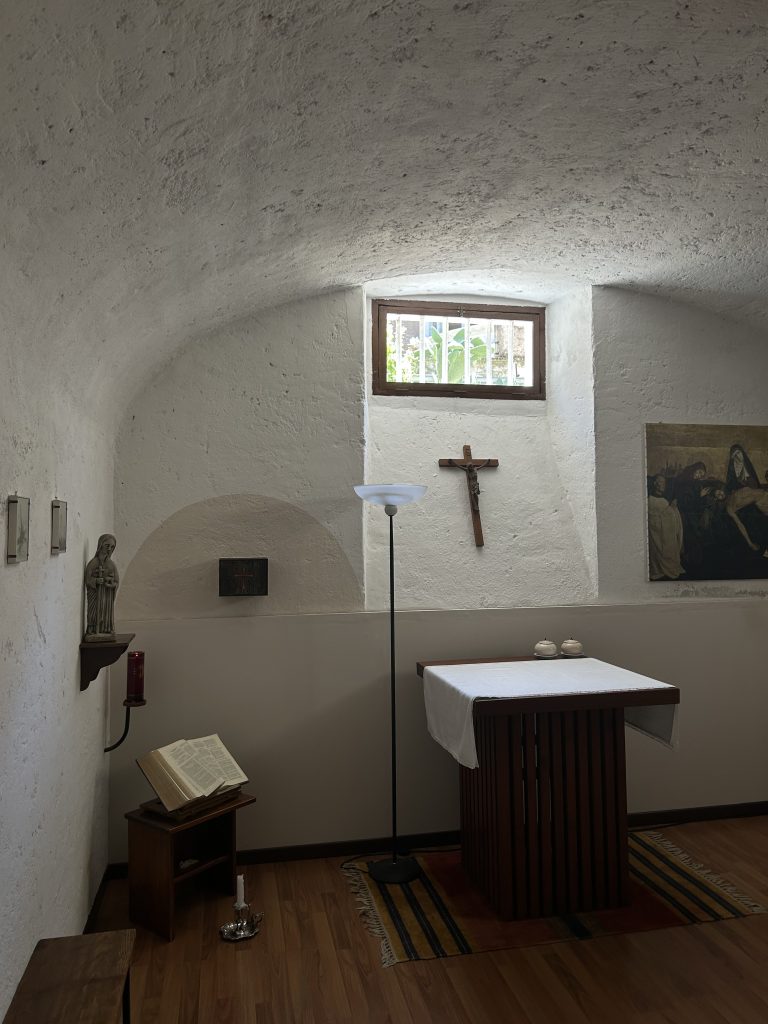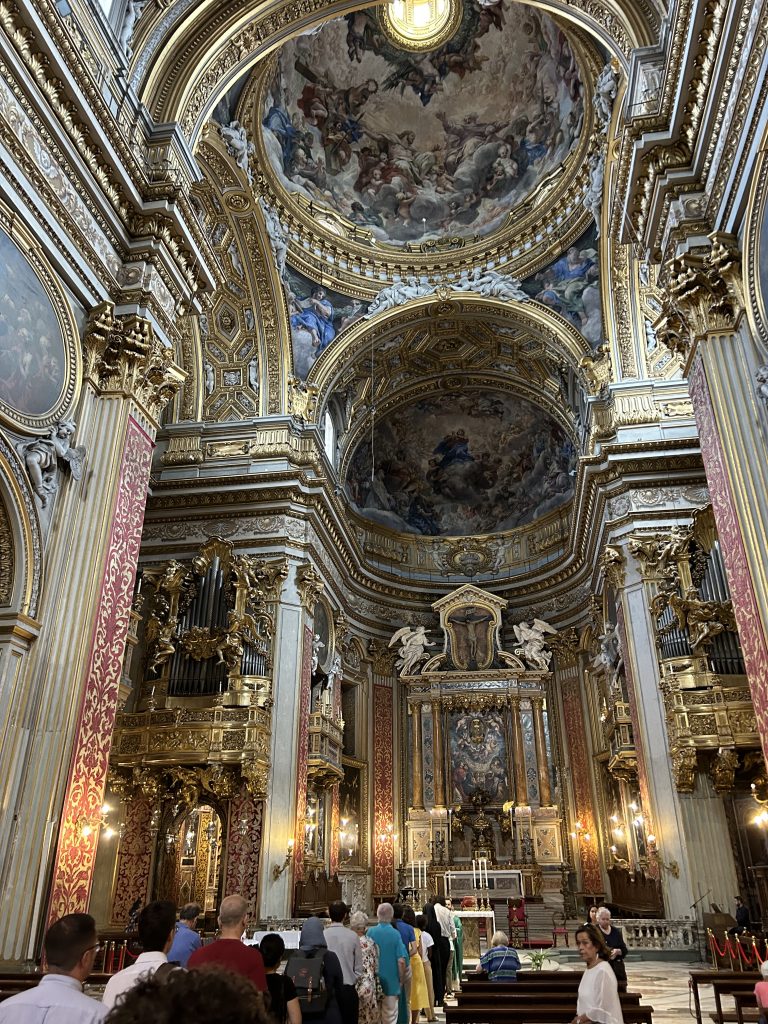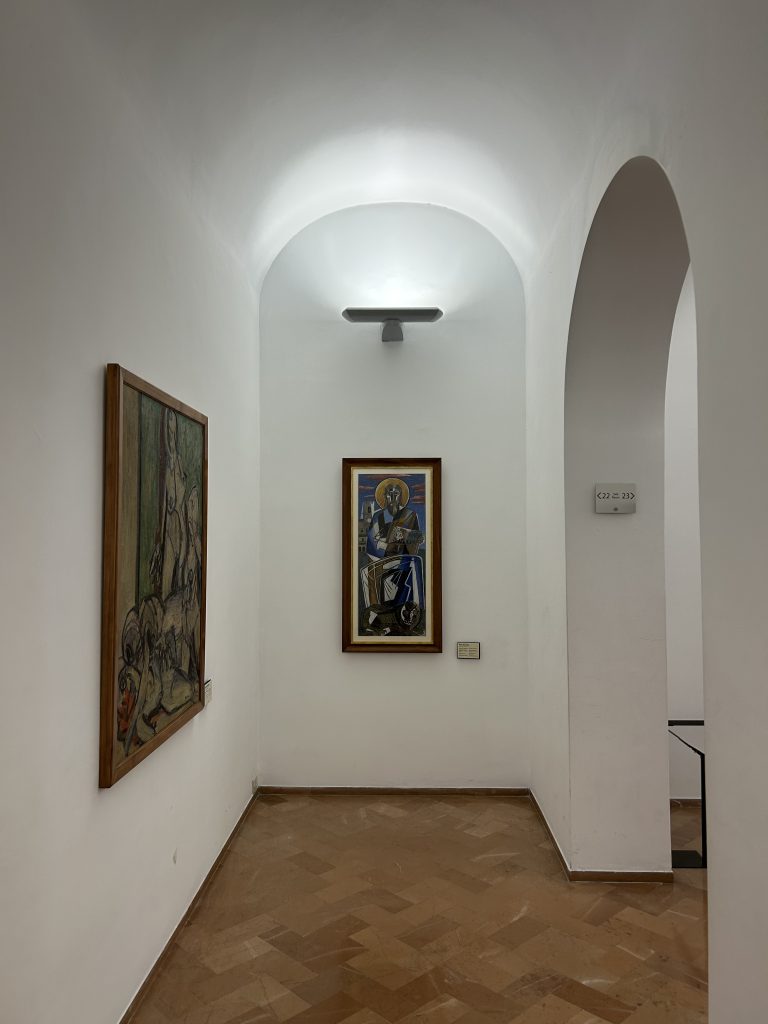The Bill Snelson Young Ecumenists Fund enabled me to travel to Rome and the Vatican City for seven days. In Rome, I stayed at the Casa Balthasar, a secular religious house for young Roman Catholics considering religious life. Broadly, the Casa is guided by the teachings of Hans Urs von Balthasar, Adrienne von Speyr, and Henri de Lubac—all influential figures in twentieth-century Catholic thought and ecumenical dialogue (von Balthasar, for example, was deeply inspired by and friends with Karl Barth).
I followed the Casa’s daily rhythm: morning study, midday rosary, lunch, study (or swimming!), Mass, dinner, Compline, and then silence. We studied a letter from St. Ignatius on Saturday evening with the Rector, Father Andrea, who emphasised the joy of following the Lord’s will during our discussions. What struck me was his reminder that God uses people as gifts for specific communities. Insofar as we follow the Lord’s will in this, we become a fragrance that “travels”, reminding the rest of us of God’s faithfulness so that we, too, might see and encounter joy.
This aspect of joyful and hope-filled obedience was further reflected in one of our dinner discussions. There, I asked one of the resident young men what they thought about Europe’s decline in young adult religious affiliation amongst young adults in Europe. His response astounded me: “Christ’s Gospel is always with us; it just needs soil and people to till the ground into soft dirt.” His reminder of being soft (meaning welcoming or fertile) has remained with me. And it was this soft hospitality freely shared by these young men that gave me hope. As we continue to till our soil (communally, ecumenically, and personally), the true promise of the Gospel will find germination. At the Casa, I discovered that this hope will be found around dinner tables with a vivid hospitality and amidst the flickering candles singing songs in the loungeroom after dark.
My experience, enabled by a grant from The Bill Snelson Young Ecumenist fund, allowed me to re-discover something ancient and new: God is found in the face of those we might perceive disagreement with. And through a rich hospitality of mutual encounter, His presence is felt, and Joy becomes our harvest.



Visiting the Vatican
Alongside my stay at the Casa, I visited Vatican City and toured their art collection. What struck me the most was the Vatican’s engagement with modern and contemporary art. Personally, coming from a more Protestant-Evangelical context which can, sometimes, lament the supposed “collapse” of art and beauty in the twentieth century, Vatican City told a different story. Room upon room was filled with great works of art; countless images had didacts beside them, noting their being “a gift from the artist”. I was reminded of Pope Paul VI’s Letter to the Artists (1965), in which his closing remarks are: ‘Be always and everywhere worthy of your ideals and you will be worthy of the Church which, by our voice, addresses to you today her message of friendship, salvation, grace and benediction.’
In the heart of the Roman Catholic Church at Vatican City, is a testimony to enduring friendship. The Vatican museum and its accrued artworks offer a memory, both ancient and new, of gifts and companionship between artists and priests. This memory suggests hope for a continued dialogue that expands the imaginative possibilities of who the church and her people might be, whether between poets and clergy, or between traditions and confessions.
This experience has solidified a suspicion of mine. The flourishing of the church will only grow at the speed of friendship. While this primarily might look like a deepening relationship with our own ecclesial communities, it is also a relationship, as Fr. Andrea reminded us, with those geographical neighbours the Lord has called us to be with. This might look like offering a delicious, fresh, homemade pizza to the parish across the road. Although that church might look, sound or talk a bit differently, the fragrance of food will nevertheless inspire shared longings: to eat, drink, and talk with each other.
My Roman experience has given me much to consider as I discern whether doctoral study and/or an ordained vocation is for me. The opportunity to experience the affective dimensions of von Balthasar’s work at the Casa has helped me to refine what I might like to research further. Functionally, it has encouraged me to continue building friendships with a diversity of artists and encouraged me to go out from under my own “roof” and build community with Christians from other traditions.
And what’s next for me?
Currently, I am working as a Chaplain Assistant at King’s College, London. This ecumenical experience has gifted me a greater appreciation for the diversity of perspectives that these students share with me. Having learnt, whilst at the Casa, how to navigate conversations so that disagreements are respected (and celebrated!), but common unity is kept at the forefront, my own language has naturally become more adept at making space for these nuances.
I am currently part of a team that is launching a new sung Mass service at the Anglo-Catholic parish, Our Most Holy Redeemer, Clerkenwell. This service is in collaboration with the contemporary Roman Catholic worship group, One Hope Project. The aim of this service is to encourage ecumenism and develop a Church of England community that is contemporary and sacramental.
I have been accepted to join the Centre for Cultural Witness as part of their Emerging Leader Programme. With them, I will have the opportunity to meet leaders and laity, communicate my own story and ecumenical experience, and discover how to more effectively tell this to a wider audience. The Bill Snelson Young Ecumenists Fund has helped give me the language and a personal case study on the power of collaboration across traditions and the beauty that can emerge from it.
Find out about The Bill Snelson Young Ecumenists Fund and read about the experience of other grant awardees.